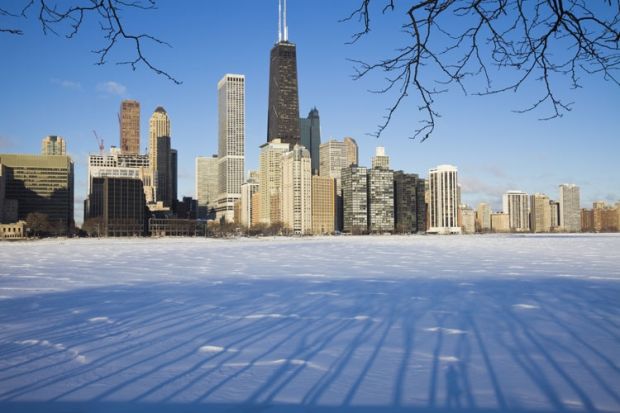Prepare for quick, whispered conversations about who’s on the up and who’s on the slide
Two extreme seasonal events hit Chicago last week. One swept into town bringing fear as well as solidarity and community, dread along with a terrible beauty: the other was the freezing “polar vortex” which left the city looking as if it was ruled by Narnia’s White Witch.
The annual convention of the Modern Language Association of America, the MLA, is said to be the largest academic conference in the world, with more than 10,000 attendees and, this year, 810 sessions and lectures.
For younger American academics, it can be cause to break into a cold sweat, as it’s where many thousands of initial job interviews take place, resulting in hundreds of second interviews and job offers for the lucky ones.
For older academics, it can be where careers ski speedily ahead or hit a wall of ice as their particular field or theoretical approach, once hot, has gone cold.
For visiting British academics it’s rather different and more fun – a chance to see what’s going on at the intellectual cutting edge of English and modern languages, to experience the refreshing professionalism of the US and to catch up with American friends.
But just as it is essential to come prepared for the “polar vortex” – I replaced my shabby donkey jacket with a coat that made me look like a gangster (in my imagination) or an evil version of the Michelin man (to everyone else) – you have to prepare for the MLA.
Using the convention’s huge handbook as your guide, the best strategy is to choose sessions on a wide range of demanding topics, then expect to change your mind as you move from panel to panel following some crucial idea about, say, the Anthropocene (the new geological age in which we live, marked by human impact on the planet) or global warming (“Winter is coming,” joked members of the Division on Popular Culture, quoting the catchline from TV epic du jour, Game of Thrones).
You have to prepare your psyche for the effects of the enormous Aladdin’s cave that is the book exhibition, where hundreds of publishers’ stands serve to boost your ego (“Look! Look! A book by me…”), dent it (…“but look at the thousands of books I haven’t read or, worse, written…”) or smash it to smithereens (“…and never will”).
You have to prepare yourself for quick, whispered conversations about who’s on the up and who’s on the slide; which fellowships might be opening up; for sudden moments of fascination (the discovery that Mexico’s Zapatistas adopted the Mayan snail symbol is intriguing, but why should the snail be an ancient emblem of war?); and humour (“But is trauma the right word to describe the range of human suffering? – I said the very same thing to Andreas last night at a party”).
Just as the weather made the news, so did the MLA: most controversially over debates about whether the association should consider boycotting Israel. While these discussions about discussions didn’t make clear what this putative symbolic boycott might actually mean, they were, I gather, serious, responsible and scholarly, rather than overheated.
The weather also made people vulnerable and, appropriately, the theme of this year’s MLA conference was “vulnerable times”, discussed in the widest senses: the traumas of history, ecological and economic calamities, as well as the crises facing our professional disciplines. And like the weather, the convention’s theme seemed to have the effect of drawing people together. It’s been about 10 years since I last went to the MLA, and as a sort of outsider, the convention seemed gentler, more supportive than I remember (though perhaps that’s just me being older and thicker skinned). It was more diverse, too, both politically and in the range of panels. But the amazing enthusiasm was still there, the reminder that even the most obscure scholarship is a communal activity, about conversation and engagement.
And just like the terrible weather, it melted away on the last day, as people flew home to the start of the new semester. Or, as the Chicago Sun-Times put it, “Gone snow fast”.
Register to continue
Why register?
- Registration is free and only takes a moment
- Once registered, you can read 3 articles a month
- Sign up for our newsletter
Subscribe
Or subscribe for unlimited access to:
- Unlimited access to news, views, insights & reviews
- Digital editions
- Digital access to THE’s university and college rankings analysis
Already registered or a current subscriber?





